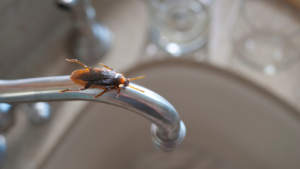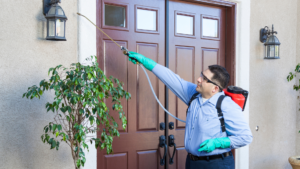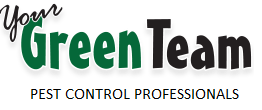
Effective Home Pest Control Before Fall
As the days grow shorter and the weather cools, pests begin their search for a warm place to spend the fall and winter months. In Florida, where the climate remains mild, this seasonal shift makes homes especially attractive to unwanted visitors like ants, roaches, and rodents. Effective home perimeter pest control becomes crucial to keeping these pests at bay.
By reinforcing your home’s defenses, you can prevent pests from entering and making themselves comfortable. Simple measures, such as sealing entry points and using natural repellents, can make a big difference. This proactive approach not only keeps your home pest-free but also reduces the need for more intensive treatments later.
This guide will help you understand the importance of perimeter pest control and provide practical tips for safeguarding your home before the fall season. With the right strategies, you can enjoy a pest-free home all year round.

The Importance of Home Perimeter Pest Control
Home perimeter pest control is crucial for preventing pests from entering your home, especially as fall approaches. As temperatures drop, pests like ants, roaches, and rodents seek warmth and food in houses. By focusing on the home's perimeter, we create a barrier that keeps these pests out.
Reinforcing this barrier helps avoid the frustration and damage pests can cause. For example, rodents can chew through wires, creating a fire hazard, while ants can contaminate food. Preventing these invaders reduces the likelihood of costly repairs and the use of harsh chemicals later.
Timing is essential. Preparing before fall ensures your home is ready when pests are most active. Regularly maintaining these barriers also helps keep pests away year-round, creating safer and more comfortable living spaces.
Common Pests in Florida During Fall
In Florida, the mild climate means many pests remain active through the fall. Some of the most common pests during this season include:
1. Ants: Ants search for food and can invade kitchens and pantries. They can also nest in walls and under floors.
2. Roaches: Roaches thrive in humid conditions and are drawn to food and water sources inside homes.
3. Rodents: Mice and rats look for warm shelter and can sneak through small cracks and holes.
4. Spiders: Spiders move indoors seeking a stable food supply and safe places to build webs.
5. Termites: While termites are a year-round problem, some species are more active in cooler months.
Identifying these pests helps you address specific problems and tailor your pest control measures accordingly. Knowing what to look for can also make inspections more effective.
Understanding Pest Behavior in Cooler Months
Understanding how pests behave as temperatures drop can improve your pest control strategy. In Florida, the change might not be drastic, but it is enough to drive pests indoors.
- Seeking Warmth: Many pests move indoors to escape cooler temperatures. Rodents may nest in attics, garages, or basements. Ants might seek shelter in walls and behind appliances.
- Searching for Food: With natural food sources dwindling, pests are more likely to invade kitchens and pantries. Roaches and rodents are particularly drawn to unsealed food containers and crumbs.
- Increased Breeding: Some pests, like rodents, may breed more frequently inside warm homes. This can lead to quicker infestations that become harder to control.
Knowing these behaviors allows you to prepare better. By keeping the home sealed and clean, you can reduce the chances of an infestation.
Key Areas to Monitor Around Your Home
Certain areas around your home are more vulnerable to pest entry. Regular monitoring of these key spots can help keep pests out:
1. Doors and Windows: Check for gaps and cracks around frames. Ensure seals and weather stripping are in good condition.
2. Foundation: Look for cracks in the foundation where pests can enter. Seal any openings promptly.
3. Roof and Attic: Inspect for gaps around vents, chimneys, and roofing materials. These are common entry points for rodents and insects.
4. Basement and Crawl Spaces: These areas are often dark and damp, attracting pests like roaches and spiders. Keep them dry and well-ventilated.
5. Garage: Ensure doors close tightly and repair any gaps. Pests often enter through open or poorly sealed garage doors.
By focusing on these areas, you can identify and fix issues before they become larger problems. Regular checks and maintenance make it harder for pests to invade, keeping your home safer and more comfortable.
Effective Natural Pest Control Solutions
Using natural pest control solutions can help keep your home safe from pests without harmful chemicals. These methods are often safer for pets and children and can be just as effective when used correctly.
- Essential Oils: Many essential oils act as natural repellents. For example, peppermint and eucalyptus oils can deter ants and spiders. Mix a few drops with water and spray around windows and doors.
- Diatomaceous Earth: This powder is made from ground-up fossil remains. It’s safe for humans but deadly for pests like ants and roaches. Sprinkle it around the perimeter of your home and in any cracks or crevices.
- Vinegar: A mix of vinegar and water can repel ants and disinfect surfaces. Use this solution to clean countertops and floors where you've seen ants.
- Herbs and Spices: Certain herbs and spices, like bay leaves and cinnamon, can deter pests. Place them in your pantry and food storage areas to keep insects out.
Using these natural methods reduces the chemical load in your home, making it a healthier environment while still keeping pests at bay.
Chemical Methods for Perimeter Pest Protection
Sometimes, natural methods are not enough, and chemical pest control solutions become necessary. These methods can offer more thorough protection, especially during heavy infestations.
- Insecticide Sprays: These are commonly used to create a protective barrier around the home. Spray along the perimeter, focusing on entry points, to kill and deter pests.
- Granular Baits: These are excellent for ants and other insects that travel in trails. Place the bait around the home’s exterior, and pests will carry it back to their colonies, effectively eliminating the problem at its source.
- Rodent Baits and Traps: For rodents, use bait stations to safely deploy poison without risking exposure to pets or children. Traps can also be effective, especially when placed in known rodent paths.
- Professional-Grade Products: Sometimes, stronger products available only through professionals might be needed. These products often last longer and cover larger areas, providing more comprehensive protection.
Using chemical methods responsibly and according to the manufacturer's instructions can provide effective protection against a wide range of pests.
How to Seal Entry Points in Your Home
Sealing entry points is a crucial part of home perimeter pest control. By closing off the paths that pests use to enter your home, you can significantly reduce infestations. Here's how:
1. Inspect Your Home: Look for cracks and gaps around windows, doors, and foundations. Pay special attention to areas where pipes and wires enter the home.
2. Use Caulk: Apply caulk to seal small cracks and gaps around windows and doors. This material is easy to use and provides a strong barrier against pests.
3. Install Door Sweeps: Add door sweeps to the bottom of exterior doors. These help close gaps under the doors, preventing pests from crawling inside.
4. Repair Screens: Make sure window and door screens are in good condition. Repair or replace any torn screens to keep flying insects out.
5. Weather Stripping: Ensure that weather stripping around doors and windows is intact. Replace any damaged or worn stripping to maintain a tight seal.
6. Block Larger Gaps: For larger gaps, use materials like steel wool or hardware cloth. These materials are tough for pests to chew through, making them excellent barriers.
By sealing these entry points, you create a physical barrier that makes it much harder for pests to invade your home.
DIY Pest Control Tips for Homeowners
Taking a do-it-yourself approach to pest control can be effective and budget-friendly. Here are some tips to help keep your home pest-free:
1. Clean Regularly: Keep your home clean and free of food crumbs and spills. Regular cleaning reduces the attractants that pests look for.
2. Proper Food Storage: Store food in airtight containers to prevent pests from accessing it. This is especially important for items like grains, sugar, and pet food.
3. Trash Management: Dispose of garbage regularly and use bins with tight-fitting lids. Clean the bins often to remove any residues that might attract pests.
4. Fix Leaks: Pests need water, so fix any leaks around pipes, sinks, and appliances. Ensure that your home is dry to make it less appealing to them.
5. Yard Maintenance: Keep your yard tidy by trimming bushes and removing debris. This reduces hiding spots for pests close to your home.
6. Inspect Packages: Check any boxes or packages you bring into your home for pests. This helps prevent bringing in new infestations.
7. Use Traps and Baits: Place traps and baits in problem areas to catch and eliminate pests. Make sure to follow all safety instructions.
DIY pest control requires regular effort, but it can be very effective at keeping pests at bay when combined with other preventive measures.
The Role of Regular Home Inspections
Regular home inspections are critical in maintaining a pest-free environment, especially as the weather cools in Florida. These inspections help you catch potential issues before they become full-blown infestations. When you inspect your home regularly, you can identify early signs of pests like droppings, nests, or chewed wires and wood. Catching these signs early makes it easier to address the problem before it spreads.
During an inspection, focus on key areas like the attic, basement, and behind appliances where pests typically hide. Check for any gaps or cracks in the foundation and around windows and doors where pests could enter. Inspecting your home regularly also helps you spot and fix moisture issues, which could attract pests like termites and cockroaches.
Finally, a thorough inspection can inform your pest treatment plan. Whether you choose natural methods or chemical treatments, knowing the problem areas helps you apply the right solutions in the right places.
Benefits Of Professional Perimeter Pest Control Services

Hiring a professional for perimeter pest control brings plenty of advantages, especially in a pest-prone area like Florida. Professionals know the local pests and have effective techniques to get rid of them. They also use high-quality products that are often more effective and longer-lasting than those available to the average consumer.
Another key benefit is that professionals conduct thorough inspections and apply treatments tailored to your specific needs. They can locate and treat hidden areas that you might miss, ensuring that your home is comprehensively protected. They also provide follow-up visits to monitor the situation and make necessary adjustments, giving you peace of mind year-round.
Professionals also free up your time. Instead of spending weekends trying to figure out the best pest control methods, you can relax, knowing the job is in expert hands.
Maintaining Pest Control Measures Year-Round
Keeping pests out is an ongoing process that doesn't end when fall is over. Even in Florida, where winters are mild, pests are active year-round. Maintaining pest control measures ensures that your home remains a sanctuary, free from rodents, insects, and other unwanted critters.
To keep pests away year-round, regularly check and maintain your home's exterior. Reinforce any areas that might have weakened, and keep your yard clean and free of debris where pests can hide. Also, maintain your natural and chemical pest barriers by reapplying treatments as recommended.
Regularly follow up on any professional services you have used. Many services offer maintenance plans, providing periodic inspections and treatments to keep your home continuously protected. Sticking to these plans can help you avoid future infestations.
Signs You Need to Call a Pest Control Professional
Knowing when to call in the pros can save you time and trouble. Here are some tell-tale signs that you need professional help:
1. Persistent Pests: If you've tried every DIY solution but the pests keep coming back, it's time to bring in an expert.
2. Damage: Finding chewed wires, damaged wood, or holes in your walls can be a sign of a serious infestation that needs professional intervention.
3. Health Risks: If you see pests like rodents that can carry diseases, don’t wait to call a professional. Protecting your health is paramount.
4. Frequent Sightings: Seeing pests frequently during the day often indicates a larger, hidden problem.
5. Unidentifiable Droppings: If you find droppings around your home and can't identify the source, it’s safer to have a professional inspect your home.
Conclusion
Keeping your home free from pests, especially in the fall and winter months, requires a comprehensive and consistent approach. By understanding pest behaviors, maintaining regular inspections, and considering professional services, you can protect your home effectively. Remember, even in a mild climate like Florida's, pests are a year-round issue that needs year-round attention.
At Your Green Team, we are committed to providing effective and environmentally friendly indoor pest control solutions. Take the first step towards a pest-free home and contact Your Green Team today for a consultation. Let us help you safeguard your home through every season!
